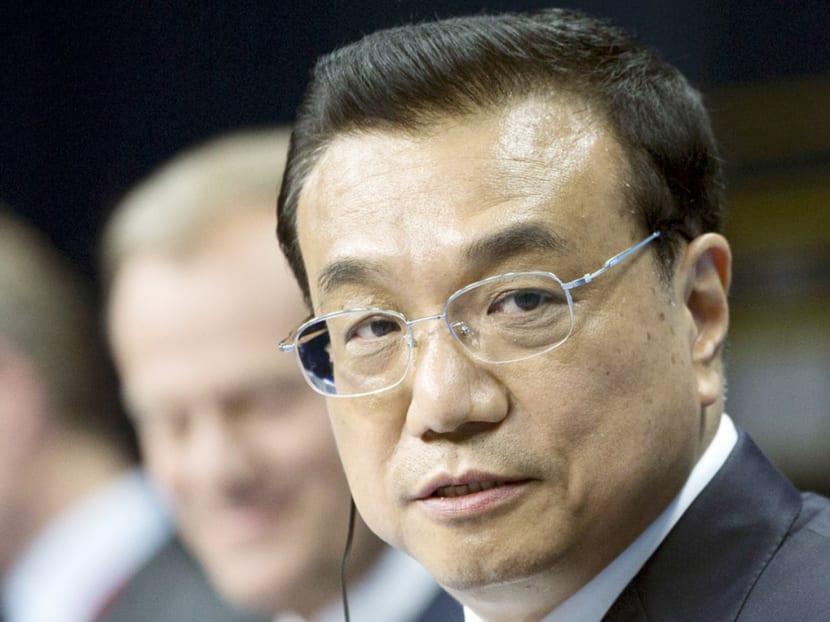China’s market turmoil raises questions over Premier’s future
BEIJING — The China-led turmoil that has rocked global markets in the past two weeks has also shaken the ruling Communist Party and left Prime Minister Li Keqiang fighting for his political future, said analysts and people familiar with the internal workings of the party.

Mr Li Keqiang may take the fall for China’s perceived mismanagement of the stock market crash and the country’s broader economic slowdown. Photo: Reuters
BEIJING — The China-led turmoil that has rocked global markets in the past two weeks has also shaken the ruling Communist Party and left Prime Minister Li Keqiang fighting for his political future, said analysts and people familiar with the internal workings of the party.
Among party officials and politically connected people in Beijing, the hottest topic of conversation is whether Mr Li will take the fall for Beijing’s perceived mismanagement of the stock market crash and the country’s broader economic slowdown.
“Premier Li’s position has certainly become more precarious as a result of the current crisis,” said Mr Willy Lam, an expert on Chinese politics at the Chinese University of Hong Kong.
“If the situation worsens and if there comes a point where (President Xi Jinping) really needs a scapegoat, then Mr Li fits the bill.”
Mr Li and Mr Ma Kai, Vice-Premier, were the architects of a now-discredited plan to rescue China’s stock markets in early July, when the government rolled out a series of unprecedented measures to prop up plunging stock prices, said people familiar with the matter.
Measures included a ban on short selling, new stock offerings and sales of any shares by large investors, and about US$200 billion (S$280 billion) worth of stock purchases by state-owned institutions. The short-lived rally that ensued persuaded many investors to jump back into the market, only to see it plummet again in recent weeks.
China’s benchmark index has fallen 22 per cent in the last four trading sessions, and the government appears to have now abandoned Mr Li’s strategy of propping up the market with massive government stock-buying.
But even if Mr Li is blamed by the party’s elite for his handling of the crisis, most analysts and serving officials believe his removal from power would be too damaging to party prestige and credibility, and that he is almost certain to remain in office, at least until the next five-yearly party Congress in 2017.
Mr Li is already regarded by most analysts and political insiders as the country’s weakest Premier in decades, thanks largely to Mr Xi’s aggressive concentration of power in his own hands.
The President has established and leads dozens of “small leading groups” that oversee policy on everything from military reform to the overhaul of China’s scandal-hit football teams. These groups outrank the formal government entities that are supposed to be in charge of those areas.
The Premier is also being widely criticised for saying, in an interview with the Financial Times in April this year, that although a weaker yuan could not be ruled out, China did not want to devalue its currency — a move it eventually made on Aug 11.
Some commentators have mocked him for incongruous public statements that suggest the government is out of touch with reality when it comes to the carnage in the equity markets.
The day after Beijing launched the rescue package to prop up the market in July, state media ran prominent articles quoting Mr Li saying the economy was in good shape and on a positive upward trajectory. There was no mention of the turmoil in the market.
This Monday, as the benchmark index fell 8.5 per cent in its worst performance since early 2007, Mr Li’s only public statement was a call for the development of China’s 3D-printing industry.
“In any other country facing such a big crisis, you would see senior officials coming out to reassure the public, but since early July, no Chinese political heavyweight has come out to say what’s going on or what the government plans to do about it,”said Mr Lam. “This has fuelled speculation that there are real divisions at the apex of the party.”
Mr Li was once thought to be the most likely candidate to replace former President Hu Jintao, before he was instead anointed as Mr Xi’s number two in 2012.
The Premier is regarded as a leading member of the faction centred on Mr Hu, known as the Communist Youth League group.
But Mr Ling Jihua, one of the most prominent members of that faction and Mr Hu’s former personal aide, was arrested earlier this year on Mr Xi’s orders on charges of corruption and abuse of power.
“There are constant rumours that Premier Li is about to be booted out, but that is partly because he is given all the toughest jobs to do,” said Mr Kerry Brown, director of the China Studies Centre at the University of Sydney.
“It would be incredibly risky to replace him at this point, but it is possible they will find a face-saving way to move him aside at the next party Congress in 2017.” FINANCIAL TIMES





